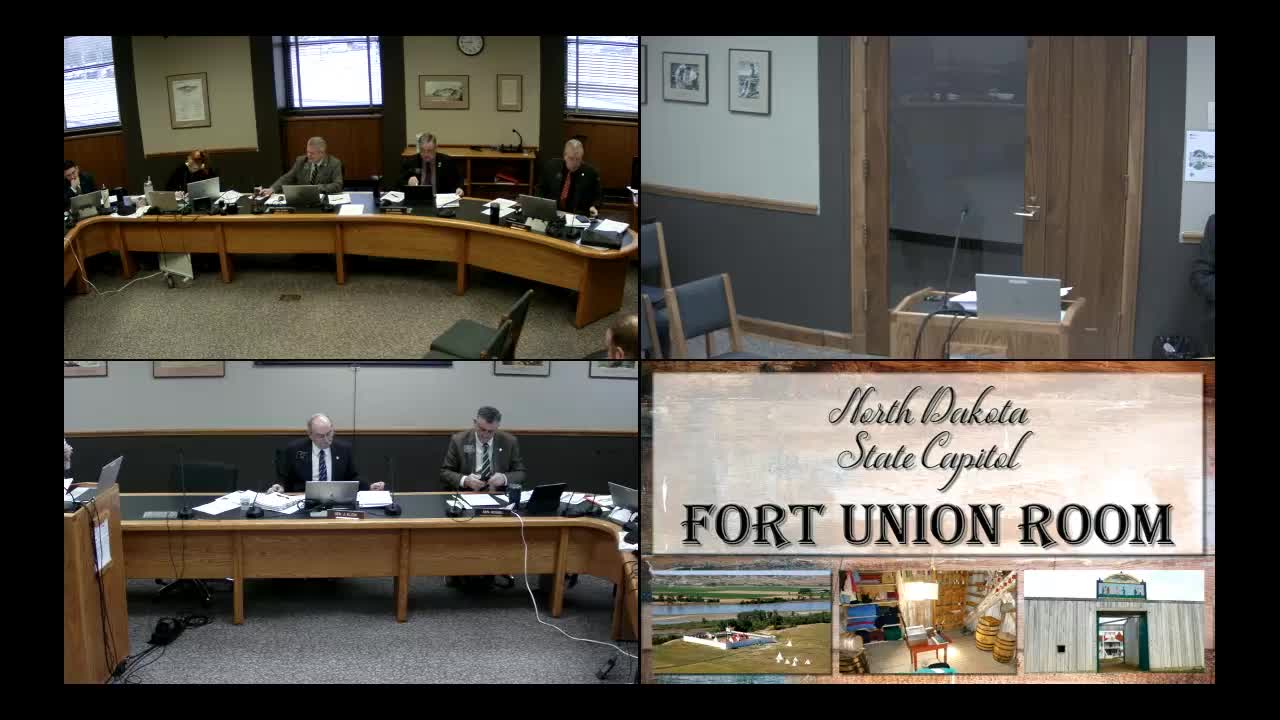Senate committee backs bill to protect long‑standing rural water service agreements after court ruling
Get AI-powered insights, summaries, and transcripts
Subscribe
Summary
The Senate Industry and Business Committee voted 5-0 to add an emergency clause and give a do-pass recommendation to legislation that would protect pre‑2025 water service agreements from being retroactively voided when the state or a state financing agency was not a formal party to the contract.
The Senate Industry and Business Committee on Tuesday voted 5-0 to add an emergency clause and give a do-pass recommendation to House Bill 15‑37, legislation designed to clarify the status of long‑standing water service agreements after a North Dakota Supreme Court ruling found some such contracts void when a state lending agency was not a formal party.
Representative Emily O'Brien, who introduced the bill, told the committee HB 15‑37 would protect agreements made before Jan. 1, 2025, by making them voidable only after 30 days' written notice from the State and by specifying that cities or rural water districts may not themselves void such agreements. "The bill now as written provides those agreements made prior to 01/01/2025 that did not have the state as a party to the agreement is voidable upon 30 days written notice from the state," O'Brien said.
The measure responds to a North Dakota Supreme Court decision interpreting North Dakota Century Code chapter 6‑09.4‑22 and federal statute 7 U.S.C. 1926(b), which, according to testimony, left some multi‑party water service agreements vulnerable to being declared legally nonexistent when the Public Finance Authority or another state lending entity was not explicitly a party.
The dispute in question began with a January–February 2000 agreement among the City of Grand Forks, Grand Forks Trail Water District and Agassiz Water Users District (later merged into what is now East Central Regional Water District). Representative O'Brien and witnesses said the city and water districts performed under the agreement for decades while USDA, the Bank of North Dakota and the Public Finance Authority were repaid on loans tied to the project. In 2020 the merged entity (now East Central) sued the city, and the North Dakota Supreme Court in July 2024 ruled that contracts lacking state agency participation fell within the statute's prohibition and were void.
Corey Sandriel, president of East Central Regional Water District, described attempts to negotiate with the city before filing suit and said the district has lost revenue from customers and infrastructure taken over by the city. He told the committee East Central serves parts of four counties, "we have over 3,775 hookups today," and that the district's territory covers roughly 1,450 square miles. Sandriel said the litigation sought more than $62,000,000 in damages and that legal bills for his district exceeded $1 million to date.
Stephanie Ingebretsen, deputy director and attorney for the North Dakota League of Cities, said the bill's current language was negotiated with the rural water association and the Public Finance Authority and is intended to protect cities and rural water districts from similar litigation going forward. Diane Amant, executive director of the Public Finance Authority, supported the engrossed version and clarified the PFA cannot review agreements it does not receive: "We can't know what we don't know," she said, describing the agency's role in reviewing agreements when they are submitted.
Committee members discussed whether the bill would affect ongoing litigation; witnesses and O'Brien said the bill does not apply to litigation filed before Jan. 1, 2025. The bill also contains language that would preserve state protections for lenders while preventing cities or rural water districts from unilaterally declaring agreements void.
Senators moved and passed, by roll call, a voice amendment adding an emergency clause to make the bill effective upon the governor's signature; the amendment passed 5‑0. The committee then voted 5‑0 to recommend a do‑pass on the amended bill. Committee roll call records show Senators Klein, Kessel, Chairman Barta (recorded in the transcript as "Chairman Bridal/Barta"), Vice Chair Boehm and Senator Engott voting aye on both the amendment and the amended bill.
Supporters urged the committee to adopt the amendment to provide immediate clarity and to avoid a window in which other parties might commence litigation while the bill's effective date was delayed. Opponents were not in the hearing room when the committee voted; committee members said some earlier opposition correspondences remained unresolved.
The committee's actions send the amended bill forward; a carrier was identified and the committee discussed whether further referral was necessary for the fiscal note. Representative O'Brien and witnesses told the committee the legislation is intended to preserve the ability of lenders and borrowers to rely on long‑standing negotiated service agreements and to prevent future litigation arising from what supporters described as a technicality in older contracts.
The bill text defines applicability and exceptions; among other provisions, it specifies that the new section would not apply to litigation commenced before Jan. 1, 2025, and that the state may void an agreement only after 30 days' written notice.
Closing remarks from committee leadership indicated the committee would carry the bill forward with the adopted emergency clause and that further floor scheduling would follow.
